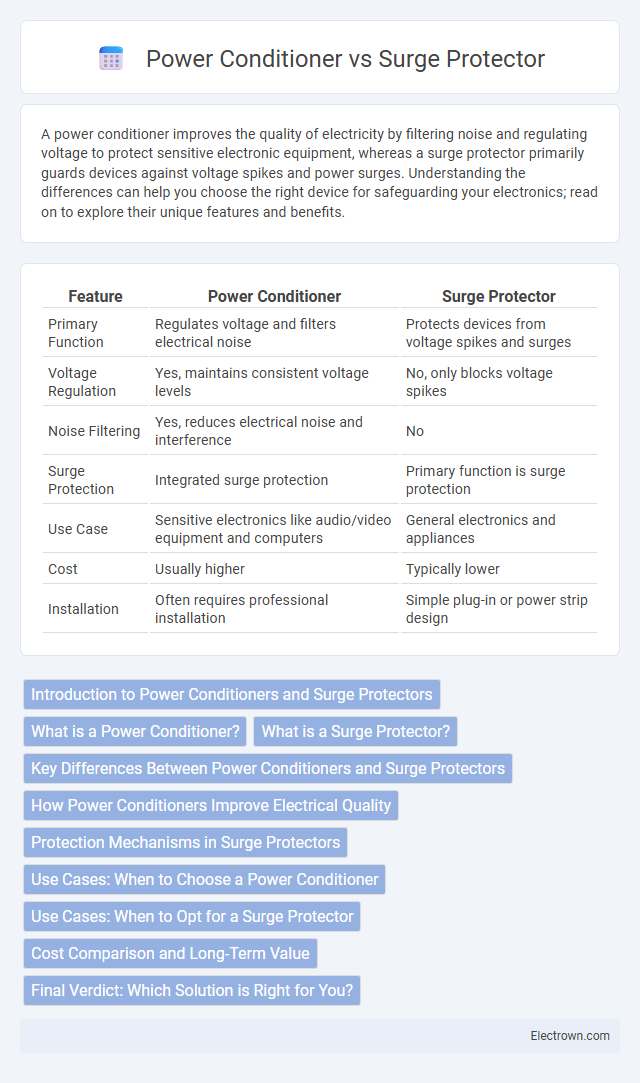A power conditioner improves the quality of electricity by filtering noise and regulating voltage to protect sensitive electronic equipment, whereas a surge protector primarily guards devices against voltage spikes and power surges. Understanding the differences can help you choose the right device for safeguarding your electronics; read on to explore their unique features and benefits.
Table of Comparison
| Feature | Power Conditioner | Surge Protector |
|---|---|---|
| Primary Function | Regulates voltage and filters electrical noise | Protects devices from voltage spikes and surges |
| Voltage Regulation | Yes, maintains consistent voltage levels | No, only blocks voltage spikes |
| Noise Filtering | Yes, reduces electrical noise and interference | No |
| Surge Protection | Integrated surge protection | Primary function is surge protection |
| Use Case | Sensitive electronics like audio/video equipment and computers | General electronics and appliances |
| Cost | Usually higher | Typically lower |
| Installation | Often requires professional installation | Simple plug-in or power strip design |
Introduction to Power Conditioners and Surge Protectors
Power conditioners and surge protectors both safeguard electronic devices but serve different functions; surge protectors primarily shield your equipment from voltage spikes by blocking or shorting excess voltage, while power conditioners regulate voltage levels and filter electrical noise for consistent power quality. Surge protectors are essential for preventing damage from sudden power surges caused by lightning strikes or electrical faults. Power conditioners improve the performance and lifespan of sensitive electronics by providing clean, stable power and reducing interference from electromagnetic and radio frequency noise.
What is a Power Conditioner?
A power conditioner regulates and cleans electricity by stabilizing voltage and filtering out noise, ensuring consistent power flow to sensitive electronic devices. Unlike a surge protector that primarily shields against voltage spikes, a power conditioner improves overall power quality, preventing equipment malfunctions and extending device lifespan. Your electronics benefit from reduced electrical interference and enhanced performance when connected to a quality power conditioner.
What is a Surge Protector?
A surge protector is an electrical device designed to shield your electronic equipment from voltage spikes by diverting excess electricity away from the connected devices. It plays a crucial role in preventing damage caused by sudden power surges, such as those from lightning strikes or power outages. Unlike power conditioners, surge protectors primarily focus on protecting against transient voltage surges rather than regulating power quality.
Key Differences Between Power Conditioners and Surge Protectors
Power conditioners regulate voltage and filter electrical noise to ensure clean and stable power for sensitive electronics, while surge protectors primarily shield devices by diverting excess voltage from spikes or surges. Your choice depends on whether you need to improve power quality or just prevent damage from sudden voltage spikes. Surge protectors are essential for basic overload protection, whereas power conditioners offer comprehensive power management for high-performance equipment.
How Power Conditioners Improve Electrical Quality
Power conditioners improve electrical quality by regulating voltage levels, reducing noise, and filtering out electrical interference to ensure stable and clean power delivery. Unlike surge protectors that only guard against voltage spikes, power conditioners actively maintain consistent power flow, protecting sensitive electronic equipment from fluctuations that can cause damage or performance issues. This enhanced electrical environment prolongs device lifespan and improves operational efficiency in various settings.
Protection Mechanisms in Surge Protectors
Surge protectors safeguard electronic devices by diverting excess voltage caused by power surges or spikes through components like metal oxide varistors (MOVs), which absorb and dissipate the surge energy. The protection mechanism involves clamping voltage levels to a safe threshold, preventing damage to connected equipment by limiting transient voltages. Unlike power conditioners, surge protectors primarily target sudden voltage spikes rather than continuous voltage regulation or noise filtering.
Use Cases: When to Choose a Power Conditioner
Power conditioners are ideal for sensitive electronics such as audio/video equipment, medical devices, and laboratory instruments requiring stable voltage and noise filtration. They are used in environments prone to electrical interference or inconsistent power supply, ensuring clean and consistent power delivery. Surge protectors, on the other hand, focus on protecting devices from voltage spikes but do not regulate voltage or filter noise, making power conditioners essential for critical applications demanding stable and clean power.
Use Cases: When to Opt for a Surge Protector
Surge protectors are ideal for safeguarding sensitive electronic devices such as computers, TVs, and home entertainment systems from sudden voltage spikes caused by lightning or power outages. They are best used in residential settings or small offices where the primary concern is preventing equipment damage due to transient surges. Surge protectors are cost-effective solutions suitable for protecting individual devices rather than regulating overall power quality or voltage stability.
Cost Comparison and Long-Term Value
Power conditioners typically have a higher upfront cost compared to surge protectors due to their advanced filtering and voltage regulation capabilities, which enhance equipment performance and lifespan. Surge protectors are more affordable initially but offer limited protection, primarily guarding against voltage spikes without improving power quality. Investing in a power conditioner provides long-term value by preventing equipment damage and reducing maintenance costs, ultimately safeguarding your electronics better than a standard surge protector.
Final Verdict: Which Solution is Right for You?
Power conditioners stabilize voltage and filter electrical noise, making them ideal for sensitive audio, video, and medical equipment requiring consistent power quality. Surge protectors focus on shielding devices from voltage spikes caused by lightning or power surges, providing essential protection for computers, appliances, and general electronics. Choosing between the two depends on whether your priority is maintaining clean, steady power or preventing damage from sudden voltage surges.
power conditioner vs surge protector Infographic

 electrown.com
electrown.com